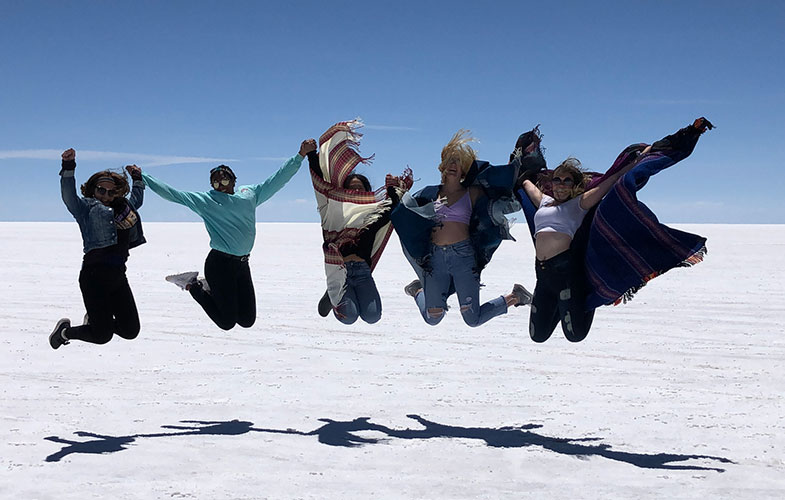Long-term Exchange Program Frequently Asked Questions
Answers to questions about high school abroad
If you have questions about long-term Rotary Exchange and ESSEX, this FAQ is a great place to start! Here are answers to some of the questions we receive most often from future outbound exchange students and their families.
1. What is ESSEX?
Every District in Rotary is encouraged to arrange and participate in student exchanges. In 1966, to facilitate the smoother functioning of the program, a number of districts in New England and the Mid-Atlantic States combined into a consortium called ESSEX (Eastern States Student Exchange).
Today, ESSEX has grown to include 32 Rotary districts, spanning from the province of Quebec, Canada, through all of the New England States, most of New Jersey and Pennsylvania, all of Delaware, Maryland and Virginia, parts of West Virginia, northeastern North Carolina, a small section of northeast Tennessee and Georgia, and all of Bermuda. In New York, Long Island and the lower section of Hudson Valley are ESSEX members.
If you live in the above areas and want more information about ESSEX’s student exchange programs, please complete the form or call 1-888-ROTARY-X (1-888-768-2799) and leave your name, address and telephone number. A local Rotary representative will contact you.
2. Who is eligible for the long-term exchange program?
High school students of good character, warm personality and average to above-average academic performance. Candidates should be adaptable and flexible, well mannered, and want to learn about other countries and cultures. Students must be 15 and cannot be older than 18.5 on August 1 of the year of departure. Non-Rotarians and children of Rotarians are encouraged to apply.
3. How do I start the process to become a long-term Rotary Exchange student?
Candidates must be sponsored by a local Rotary club. Contact any member of the club regarding details and application information. Find the Rotary club near you.
4. Is it called and exchange program because my parents must host a student from another country?
While it is incredibly rewarding and ideal, it is not mandatory for your family to host an exchange student if you participate in long-term exchange program. It is however, called an exchange program because an agreement is made between Rotary organizations here and abroad with our students going abroad and their students coming here. A Rotary club that sponsors students from its community to go abroad also hosts students in exchange. Many parents of outbound students will host an exchange student for a part of the year and help the Rotary club identify other host families that will be approved by the club.
5. Do I have to speak a foreign language to be accepted?
It depends on the country you select. The program is cultural and academic in nature and lasts an academic year. This means that students are required to attend the local high school, which usually teaches in the foreign language. The need for a working knowledge or proficiency in the language varies depending on the country. Knowing as much as possible of the language upon arrival in your host country is essential.
6. What countries may participate in Rotary’s Long-term Exchange Program managed by ESSEX?
7. Are educational credits transferable?
Some U.S. high schools do accept credits. However, it depends on your school system and the school you will attend while abroad. To get credit, you MUST make arrangements with your local school principal prior to your departure.
8. Why are Rotary’s student exchange programs better than other programs?
Rotary Exchange is run by volunteers. It is organized and administered by volunteer Rotarians and their families throughout the world within the local Rotary club, the district, and regionally. Rotary volunteers screen student applicants, select exchange students, prepare them, and arrange hosting abroad, travel, insurance, school admission, visas, etc. All of this is done by Rotarians as an unpaid service.
Students often attend Rotary club meetings and get to know Rotarians who are generally the local business and professional leaders of that community. Sometimes these connections benefit students later in life in their academic, business or professional lives.
Because the Rotary Exchange program is run by volunteers and students stay with a host family, the program is significantly less than competitive programs. It is also one of the safest programs for teens.
9. What does Rotary do to keep me safe?
ESSEX and Rotary closely monitor what is happening in the regions of the countries in which it exchanges. All host families must go through an extensive background check process to ensure safety. Rotarians who serve as counselors also must participate in the background check process. Rotary also complies with U.S. State Department regulations for exchange.

Find Out More
Learn more about the Rotary
long-term exchange program.

How to Apply
Ready to pack your bags? What you need to know about applying.

Explore Countries
See which countries you can study abroad.
